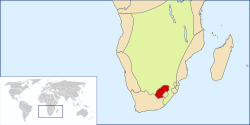Orange River Sovereignty
| Orange River Sovereignty | ||||||||
| British colony | ||||||||
|
||||||||
|
Location of the Orange River Sovereignty, early 1850s
|
||||||||
| Capital | Bloemfontein | |||||||
| Languages | Dutch, Afrikaans, English, Sesotho | |||||||
| Religion | Dutch Reformed, African religions | |||||||
| Government | Constitutional monarchy | |||||||
| Queen | Victoria | |||||||
| Resident | ||||||||
| • | 1848–1852 | Henry Douglas Warden | ||||||
| • | 1852–1854 | Henry Green | ||||||
| Commissioners | ||||||||
| • | 1849–1853 | C. U. Stuart | ||||||
| • | 1853–1854 | Sir George Russell Clerk | ||||||
| Historical era | 19th century | |||||||
| • | British Colony founded | 3 February 1848 | ||||||
| • | Dominion renounced | 30 January 1854 | ||||||
| • | Bloemfontein Convention | 23 February 1854 | ||||||
| • | British garrison departed | 11 March 1854 | ||||||
|
||||||||
The Orange River Sovereignty (1848–1854) was a short-lived political entity between the Orange and Vaal rivers in southern Africa. In 1854, it became the Orange Free State, and is now the Free State province of South Africa.
On 8 December 1845 Captain William Sutton was appointed "British Resident among the tribes living beyond the Frontier to the North-East" (relative to Cape Colony).
Sutton was succeeded as Resident on 16 January 1846 by Captain Henry Douglas Warden, who bought the farm Bloemfontein to establish the capital. Warden was soon promoted to Major, and in March 1849 he was succeeded at Bloemfontein as civil commissioner by Mr C. U. Stuart, but he remained British resident until July 1852.
Sir Harry Smith proclaimed British sovereignty over the Transorange on 3 February 1848. A nominated legislative council was created, a high court established and other steps taken for the orderly government of the country, which was officially styled the Orange River Sovereignty. In October 1849 King Moshoeshoe I was induced to sign a new arrangement considerably curtailing the boundaries of the Basuto reserve. The frontier towards the Sovereignty was thereafter known as the Warden line. A little later the reserves of other chieftains were precisely defined.
The British Resident had, however, no force sufficient to maintain his authority, and Moshoeshoe and all the neighbouring clans became involved in hostilities with one another and with the Europeans. In 1851 Moshoeshoe joined the republican party in the Sovereignty in an invitation to Andries Pretorius to recross the Vaal. The intervention of Pretorius resulted in the Sand River Convention of 1852, which acknowledged the independence of the Transvaal but left the status of the Sovereignty untouched.
...
Wikipedia


